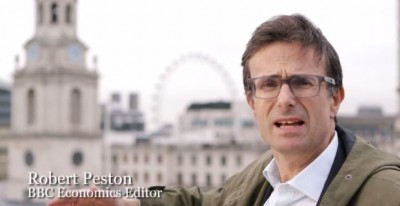BBC Reporter: Google Moving to “Suppress Legitimate Journalism”
"Right to be forgotten" ruling threatens to "curb freedom of expression"

BBC economics editor Robert Peston warns that Google’s implementation of the controversial “right to be forgotten” ruling is working to “suppress legitimate journalism” after one of his articles about Merrill Lynch boss Stan O’Neal was scrubbed from the search engine.
A recent ruling in the European Court of Justice mandated that Google must delete “inadequate, irrelevant or no longer relevant” data when it receives a request to do so, which could open the floodgates for powerful individuals, corporations and institutions to hide past evidence of wrongdoing in a chilling throwback to George Orwell’s “memory hole.”
Peston complains about how Google notified the BBC that one of his 2007 articles about former Merrill Lynch boss Stan O’Neal’s role in the financial collapse had been deleted from search results for Google users in Europe.
Peston questioned how the article represented “inadequate, irrelevant or no longer relevant” information, stating,
“There is an argument that in removing the blog, Google is confirming the fears of many in the industry that the “right to be forgotten” will be abused to curb freedom of expression and to suppress legitimate journalism that is in the public interest.”
Peston later updated his piece to note that it could have been an individual in the comments section who flagged the article for deletion by Google, a prospect that threatens even more widespread ‘disappearing’ of news articles.
Google has already received over 50,000 requests to remove articles from its European search results in the few days since the ruling was implemented and has hired “an army of para legals” to deal with the influx.
The London Guardian was also informed that six of their articles had vanished down the memory hole, with the newspaper’s special projects editor James Ball warning , “there will likely be many more as the rich and powerful look to scrub up their online images, doubtless with the help of a new wave of “reputation management” firms.”
Ball says that editorial decisions belong with publishers, not Google, and that news outlets need to fight back against what represents a challenge to press freedom.
As we have previously highlighted, Google and its subsidiary YouTube routinely acquiesce to requests from authorities to remove information, including on the basis of dubious justifications such as if material contains “government criticism.”
One such example was You Tube’s compliance with a request from the British government to censor footage of the British Constitution Group’s Lawful Rebellion protest, during which they attempted to conduct a civil arrest of Judge Michael Peake at Birkenhead county court.
Government orders to remove content from Google have spiked over the last 18 months, with requests surging by 26% in the final months of 2012.
Paul Joseph Watson is the editor at large of Infowars.com and Prison Planet.com.

